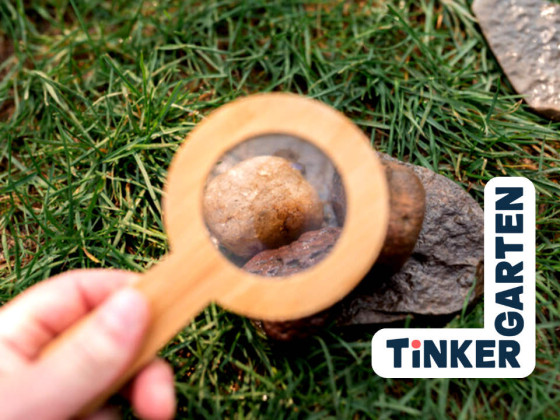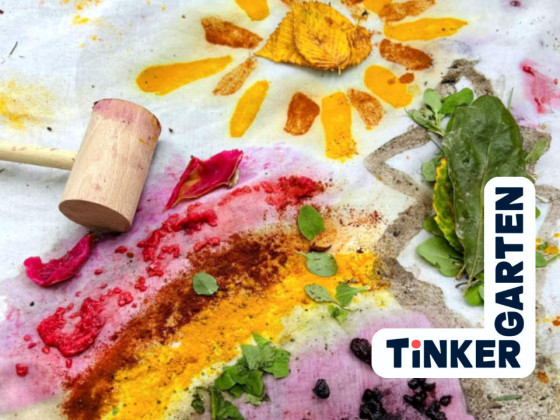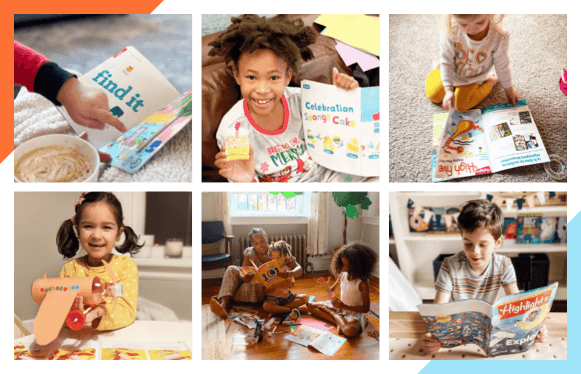12 Ways to Play With Rocks
By: Tinkergarten
Collecting and exploring rocks teaches toddlers, preschoolers and elementary age kids a host of things from focus to creativity to building a foundation in STEAM concepts.
Rock collecting is universally captivating for kids. Holding and beholding stones can also help kids feel calm and grounded, an essential component of Wellness. Try out one or more of these 12 ways to help kids explore and create with rocks!
1. Rock Wash.
Offer a bowl of sudsy water and a few tools like sponges, washcloths or an old toothbrush and welcome kids to give rocks a good wash. Notice together what colors and patterns appear in the rocks when wet vs. dry.
2. Rock sort.
Offer containers or empty egg cartons for kids to sort their rock collection based on their characteristics, such as size, shape, color, texture, weight or how well they roll. Older kids can write or draw labels for their categories, too.
3. Stack stones.
Kids can stack stones on top of each other to make an outdoor sculpture for family, friends or passersby to enjoy. Leave a pile of stones nearby for others to add to as well.
4. Shapes of joy.
Lay down a piece of string or use sidewalk chalk to form the outline of a spiral, circle or other shape. Or, just draw a line in the dirt or sand with a stick or your finger. Then, kids can follow your outline as they place stones along the outline. Read more about this activity here.

5. Rock hunt.
Mark some rocks with a permanent marker or paint and hide them around your outdoor space so kids can enjoy a rock treasure hunt. Kids can create a treasure map to mark the hidden spots. Explore the concept of camouflage by marking some rocks with bright colors and leaving some rocks unmarked. Which ones are easiest and hardest to find?
6. Story stones.
Use paint or markers to draw various pictures on stones. Some ideas include animals, plants and trees or weather pictures. Model placing two of the stones next to each other and tell a simple story about the two images. Invite kids to add another stone and suggest what might happen next in the story.
7. Kindness rocks.
Invite kids to paint or draw pictures or words on rocks that they think would make other people smile. Then, place the rocks along a trail or around the neighborhood where passersby might discover them. Read more about this activity here.
8. Creature friends.
Use paint and permanent markers to transform a rock into a favorite creature. Then, offer kids a bin or bowl and nature treasures to create a hideout, home or special play space for creature friends. Kids can turn rocks into lizard friends, make an underwater garden for an octopus, or make a mud bath for pig friends.

9. Explore texture.
Place a few rocks into a pillowcase, sock or a cardboard box with a hole cut out on one side. Invite kids to reach inside and describe how the rocks feel. Are they smooth, rough, bumpy, pointy? To continue exploring rock texture, press rocks into mud or forest putty to see what kind of print they leave. Or, use paper and crayon to make a rock rubbing.
10. Peek-A-Book rocks.
Offer kids a magnifying glass and invite them to look closely at one rock in their collection and describe what they see. What colors do they see? Is there more than one color? Is it round, pointy or shaped like an animal? Is it dull, shiny or sparkly? Is it big? Heavy? Then, test for those examination skills by placing the rock into a bowl with other rocks and mix them up. Can kids find their original rock?
11. Rock band.
Drop a rock from your collection into a container to notice the sound that the rock makes. Try out different containers (aluminum bottle, recycled plastic container, cardboard box) and different surfaces (mud, grass, pavement) to see how the sounds differ. Then, fill up a recycled container with rocks, place the lid on and enjoy the sounds you can make with your own rock shaker!
12. Excavation.
To help kids learn how geologists discover rocks, offer a few tools such as a stick and a paintbrush and invite kids to carefully uncover and remove rocks from the earth. Or, bury some rocks from your collection in the dirt or sand and invite kids to excavate them.

Extend the Play!
Want more activities like this? Transform rocks, water and objects from nature into "Stone Soup" or bury rocks and other treasures in mud and excavate them with our Nature Fossils DIY.
Why this is Good for Kids
Slowing down to observe and describe the appearance, texture (and even sound) of rocks is a super way to support kids' focus and language skills. When kids manipulate and create with rocks, they also activate multiple senses, creativity and feel more centered and focused.









